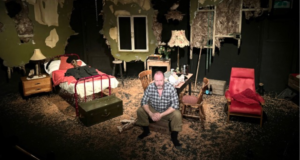Pros: This multi-media experience of light, music and video is modern, fast-paced and engaging.
Cons: This play is only being shown until the 16 November 2013, and I don’t think they’re doing a UK tour. Chalk Farm is a thought-provoking social commentary that should not be missed. Period.
Summary
Rating
Unmissable!
Chalk Farm tells the story through the eyes of a mother (Julia Taudevin) and son (Thomas Dennis) living on a north London estate, who relay the events of the riot in their local area – and some family history – through direct address to the audience. Rarely do they speak to each other, or even face each other. The direction here was effective, because it gave a physical representation of the barrier that existed between the two characters, and this communication problem spoke to the larger social issues in play.This is a play that should be seen, a play whose thoughts and feelings should be brought into the consciousness of as many people in the UK as possible. This play made me think, and I’m still thinking now (an infrequent occurrence). Chalk Farm relives events and experiences from the London riots that took place in 2011, and it does so with a clear focus, perceptible in both the to-the-point-dialogue and attention grabbing visuals.
The set was a bare stage but for twelve screens, and the occasional stool. The use of video throughout was mood enhancing, and it set the scene particularly well at the beginning. On entering the auditorium, the screens showed static snow with the fuzzy noise of a television set; given that a large proportion of the country experienced the riots through this medium, it made an important statement about perspective. As the play progressed, this issue of perspective became all the more important, and I was drawn to both the mother and son, empathising and understanding them both through their personal and somewhat internal accounts. They both had a voice, and watching the riots on the television, these voices were nowhere to be seen.
Julia Taudevin’s performance provided affecting insight into the feelings and concerns of a hardworking single parent. At one point she related, and responded to, a work phone conversation within which an insurance claimant damned all the locals of Adelaide Road (the mother’s environ) “chavs and scum”. The anger and resentment displayed was powerful, and it demonstrated how the country’s and victim’s responses to the riots were incredibly influential – they sustained the wrath, provoked the pain. Assumptions and comments made were as revelatory of Britain’s sociological problems as the looting and destruction of public property. The mother’s performance was so smartly written and acted that it contributed to my perception of and feelings towards the character of the son as well. The reiteration of her belief that her son was not a bad kid, not a bad boy (I cannot recall verbatim), really penetrated.
This boy wasn’t a bad person, he wasn’t out to hurt other people; he loves his mother, and he wants to take care of her, as she has taken care of him; but beyond the security of their tiny flat in the council estate, there is nowhere for this love and goodness to grow. He is unbearably bored, and when the riots break out it feels like something is happening, so he runs into Sainsbury’s alongside everyone else. The son the mother knows is the boy whose favourite lunchbox treat is a cheese and pickle sandwich; but the young man the mother doesn’t know, and the young man we listen to, is entirely removed from this symbol of innocence. He’s lost, beyond reach. The barrier can’t be broken.
The play raises interesting questions about history; what is it, who writes it, and who makes it. Beyond the immediate question of the 2011 riots I wonder about the lifespan of this play, and any new piece of drama that dares to enter the overcrowded stages and literary studios of Britain. In this case I hope the play will be recognised for its spectacular account of a moment in our national history that should not be forgotten. There is a lot more I could say about this play, because the play itself says so much, but it’s probably better that you see and hear it for yourself.
Writers: AJ Taudevin and Kieran Hurley
Director: Neil Bettles
Booking Until: 16 November 2013.
Box Office: 020 8743 5050
Booking Link: http://www.bushtheatre.co.uk/
 Everything Theatre Reviews, interviews and news for theatre lovers, London and beyond
Everything Theatre Reviews, interviews and news for theatre lovers, London and beyond


